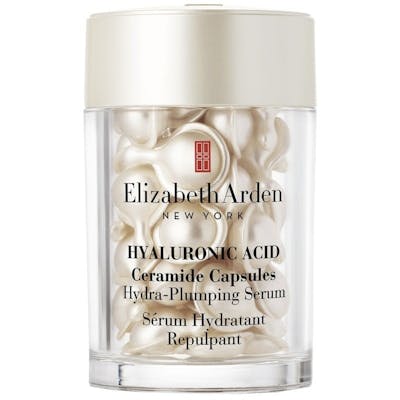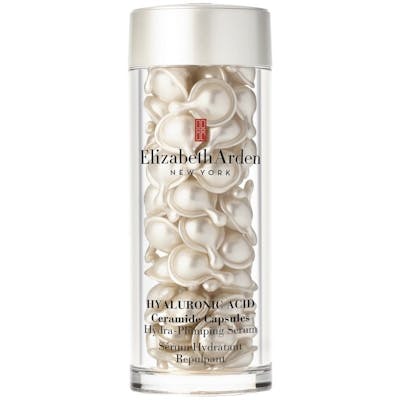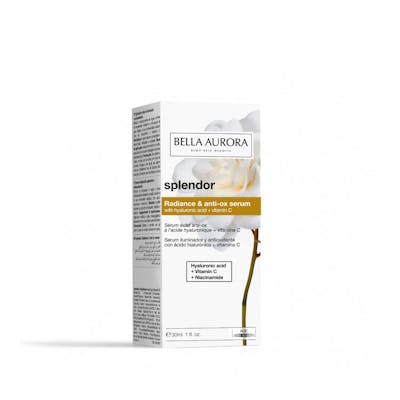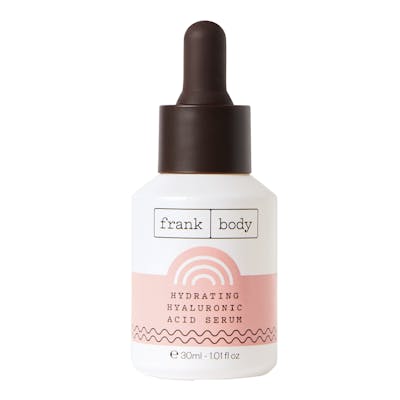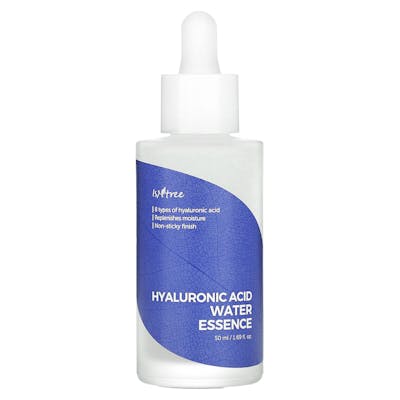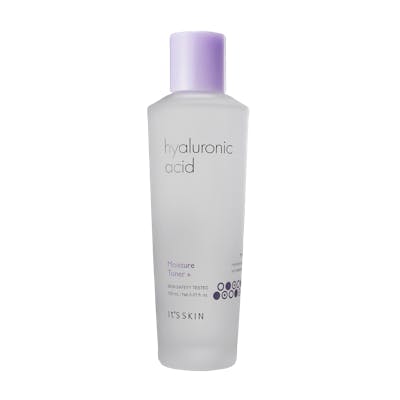
Everything you need to know about Hyaluronic acid
You've probably heard of the famous acids that have taken the skincare world by storm. Namely hyaluronic acid and salicylic acid. These are ingredients that are difficult to avoid in beauty care.
Hyaluronic acid is an ingredient we adore in our skin care routines thanks to its many great moisturizing properties. In skin care, hyaluronic acid is included in a wide range of products in the fight against anti-aging, gray and tired skin. Read along here and learn more about hyaluronic acid.
Benefits
- Contributes to healthier and nicer skin
- Helps your skin absorb moisture
- Strengthens the skin after sun damage
- Increases the absorption of moisture in the skin
- Increases the skin's collagen production
What is hyaluronic acid?
Despite the name Hyaluronic acid, it is not actually an acid, but a sugar molecule produced naturally by the body. In our body, hyaluronic acid binds with water and creates a jelly-like substance. This substance acts as a moisturizing lubricant and creates a cushioning effect between the fibers of the skin, the collagen and elastin, as well as in our tendons, muscles and lungs.
Hyaluronic acid in the skin contributes to volume and firmness. Hyaluronic acid has the ability to absorb moisture from the environment into the skin and then help deliver long-term hydration. Although the body produces hyaluronic acid itself, production unfortunately declines with age. When the skin lacks hyaluronic acid, the skin loses its elasticity and dries out, increasing the visibility of wrinkles.
As a replacement for the body's own production, there are many skin care products and nutritional supplements today that contain the fantastic hyaluronic acid. Hyaluronic acid is also found in some foods, e.g. in animal products such as liver or meat, as well as in citrus fruits, potatoes and bananas.
How does hyaluronic acid work?
Hyaluronic acid has several times been referred to as "the holy grail" when it comes to skin care. Hyaluronic acid is best known as its own moisture champion and a true miracle worker in the fight against anti-ageing.
Hyaluronic acid works by binding the moisture in the skin. In fact, hyaluronic acid can bind 1,000 times its own weight in water. This means that the skin has the opportunity to regain its elasticity, moisture and fullness and, not least, glow. You can say that hyaluronic acid keeps the joints "lubricated" and the eyes moist. Older people may nod in recognition of suffering from dry eyes and stiff joints. Hyaluronic acid in creams, serums, make-up or supplements can prevent and rebuild it.
Hyaluronic acid also contributes to boosting collagen production in the skin, the lack of which is also a culprit in the appearance of wrinkles. Both our hyaluronic and collagen levels in the body decrease as we age. When our skin suffers from a lack of hyaluronic acid, it is reflected in the form of both wrinkles, dry and loose skin structure and a lack of glow.
By incorporating hyaluronic acid into your daily skin care routine, you can easily prevent wrinkles and fine lines while quickly achieving the enviable glow you've always dreamed of.
Suitable for…
- Anti-aging
- Impure skin
- Dry skin
- Sensitive skin
- Application
You can advantageously use your hyaluronic acid serum, cream or lotion both morning and evening before you apply your face creams to achieve maximum moisture in the skin. Try experimenting with what works best for you, even if it's only morning or night - or both. No two faces are alike, nor is there any universal recipe for the perfect skincare routine.
If hyaluronic acid is used incorrectly, it can have the opposite effect than expected. Hyaluronic acid can dehydrate the skin if the product does not have enough moisture in its surroundings. In an environment with dry air or a lack of moisture in skin care, hyaluronic acid will find the moisture "from within" and this can cause dehydration of your skin. If you use a hyaluronic acid serum, booster or mask, always finish with a day or night cream to seal in the moisture.
How long does it take to see results?
Immediately.
Good to know
Hyaluronic acid can be used in combination with other products in your skin care routine such as vitamin C, retinol and peeling. However, hyaluronic acid and glycolic acid should not be combined, as this combination will impair the effect of hyaluronic acid.
Use of hyaluronic acid in skin care
Hyaluronic acid is used in more and more skin care and makeup products. This is due to hyaluronic acid's ability to bind moisture in the skin - and that the active ingredients can be used on all skin types. If you would like to support healthy and resilient skin, you can use hyaluronic acid serums, hyaluronic acid creams or dietary supplements with added hyaluronic acid, which work from the inside.
Hyaluronic acid serum
Hyaluronic acid in itself is not moisturizing, but rather moisture-binding. Therefore, hyaluronic acid is actually better suited in a serum than in a cream. A serum is applied before other skin care and can thus promote the skin's prerequisites for receiving the subsequent care. Hyaluronic acid serum is especially good if your skin is usually very dry, mature and maybe even has a little redness and irritation. What makes a serum with hyaluronic acid different is the content and amount of moisture. It is higher than, for example, what a hyaluronic acid cream contains. This is exactly why hyaluronic acid serum is good for the above mentioned type of skin.
Hyaluronic acid in cream
If you are looking for a cheaper alternative to an expensive hyaluronic acid serum, then you can very well make use of a hyaluronic acid cream. Hyaluronic acid cream is a big market, whether you are looking for a day cream or a night cream. There can be various advantages to using day and night creams with hyaluronic acid in them. A night cream and day cream are in themselves good products to incorporate into your daily routine when it comes to skin care. In addition, hyaluronic acid is a powerful anti-aging ingredient. Hyaluronic acid in skin care ensures younger and fresher skin. When you use a hyaluronic acid cream, you help the skin to have a better looking, more uniform and healthier surface.
Day cream
When you use a day cream with hyaluronic acid, you ensure that your skin gets plenty of moisture during the day. During the day, your skin is exposed to environmental pollutants, wind and weather. Your face in particular therefore needs extra moisturizing nourishment during the day, in order to withstand "the harsh environment".
Night cream
The above also applies when you choose a night cream with hyaluronic acid. The skin care routine in the evening is an extremely important step towards healthy and beautiful skin. It's at night that your skin regenerates and rebuilds itself - and that's why you have to help it right here! Give your skin a good amount of care in the form of moisture and vitamins in your night cream with hyaluronic acid.
Face masks with hyaluronic acid
Face masks with hyaluronic acid offer numerous benefits for the skin, especially for those with dry or dehydrated skin. Hyaluronic acid is a naturally occurring substance in the body that helps retain moisture in the skin, keeping it plump and hydrated. When applied topically in a face mask, hyaluronic acid penetrates the skin, leaving it soft, smooth and beautiful. Hyaluronic acid moisturizes the skin in depth, smoothes fine lines and wrinkles, improves skin elasticity and relieves irritation.
Face masks are not to be used daily, but are meant to be an excellent addition to any skin care routine during the week. However, it is important to choose a high-quality product and follow the instructions for use to ensure maximum effect.
Makeup with hyaluronic acid
If you suffer from very dry and dull skin, you can advantageously choose makeup with hyaluronic acid. By choosing a makeup product with added hyaluronic acid, you give the skin the best conditions to stay healthy, well-groomed and moisturized.
 Save on everything
Save on everything


